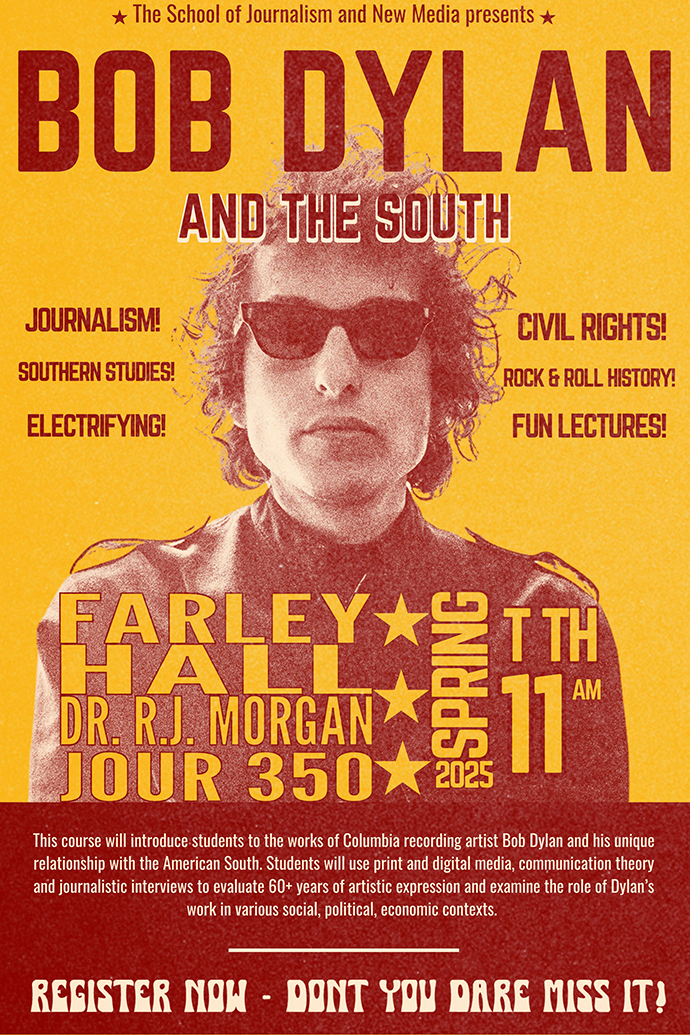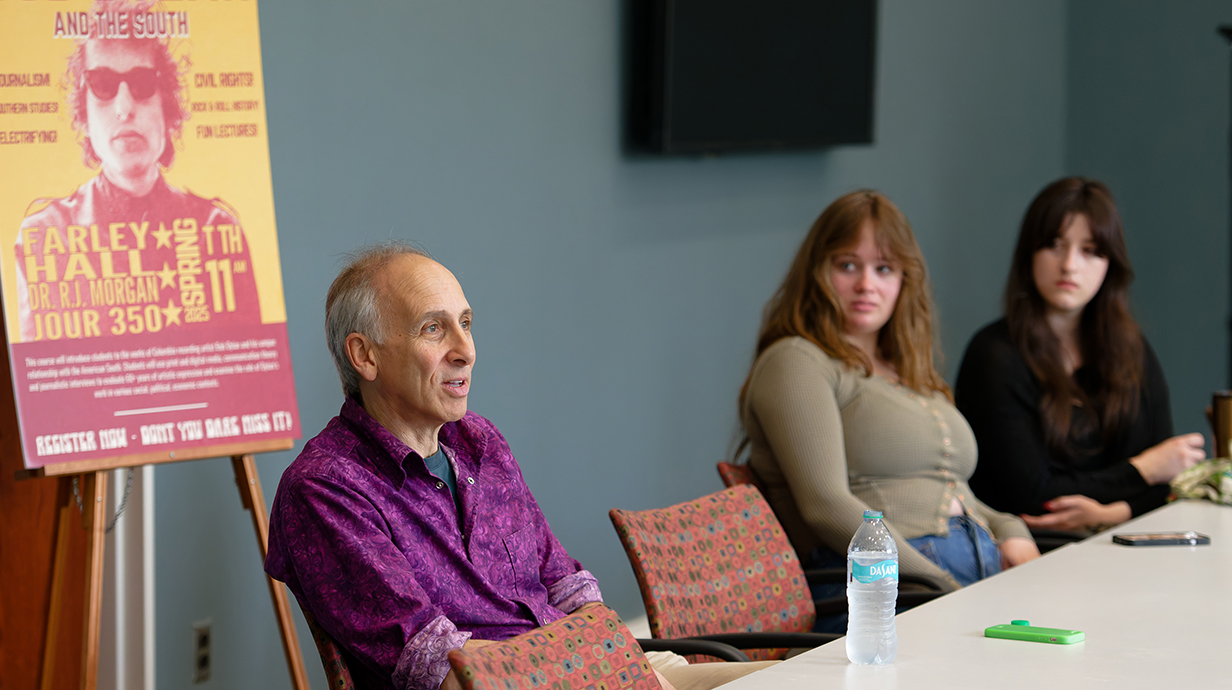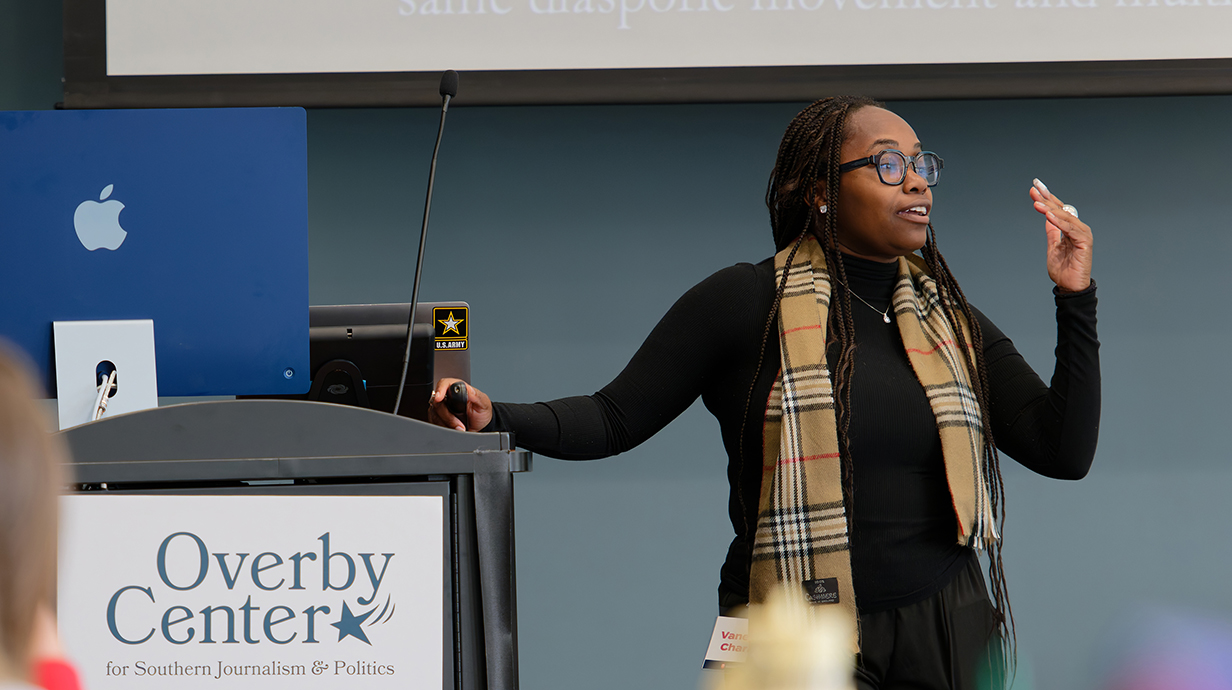Ole Miss Class Explores Bob Dylan's Deep Cultural Influence
Unique Ole Miss course examines singer-songwriter's connection to the region

OXFORD, Miss. – University of Mississippi students have had as eclectic and iconic an experience as Bob Dylan himself as they study the musician's relationship to the South.
What began as an aha moment with the realization that more than 70 of Dylan's 600 songs relate to the region and its culture turned into the class titled Bob Dylan and The South, taught by R.J. Morgan, instructional associate professor of journalism and director of the Mississippi Scholastic Press Association.
"It makes sense that Ole Miss would be a logical ground zero for the study of Bob Dylan in the South since our campus is literally name-checked in the Bob Dylan song 'Oxford Town,'" Morgan said.

Dylan's music has been influenced by the region, whether by the blues or events such as the murders of Emmett Till and Medgar Evers and the integration of Ole Miss. Students in the class learn about these influences as well as history, culture and writing skills – all from his songs.
"There's a lot to learn about storytelling and the power and role of media in society from Dylan," Morgan said. "There are valuable skills students can learn about critiquing media as a journalist, as a writer or as a researcher, and being able to take a piece of art – a song, a painting or a play – and analyze it, critique it and discuss it."
To help students acquire these skills, Morgan positioned himself as the semester-long narrator of the many eras and pivots in Dylan's career. As any journalist does, he consulted and drew on the expertise of experts.
Dylan fans and scholars from throughout the university and local and national communities have shared their prowess with 25 students of various majors.
Renowned author Elijah Wald spoke to the class about his experience with writing, music, history and writing about music history. He wrote "Dylan Goes Electric! Newport, Seegar, Dylan and the Night that Split the Sixties" (HarperCollins, 2015), which is the basis for the movie "A Complete Unknown," which starred Timothee Chalamet and was nominated for eight Academy Awards earlier this year.
Wald characterizes Dylan as a performer and musician who likes to play good music regardless of genre and songwriter. He said he wanted his book to make people think since it is not about Dylan's songwriting, but about his development as a musician and his choice to go electric at the Newport Folk Festival in 1965.
"History is always something we're constructing in the present, using what's useful for our present purposes out of the past," Wald said. "One thing that we didn't need was another Dylan book."

Elijah Wald (left) discusses the influences that shaped Bob Dylan's music with Ole Miss students in R.J. Morgan's Dylan and The South course. Photo by Hunt Mercier/Ole Miss Digital Imaging Services
He advised students about looking for different angles by which to tell stories.
"If you go in and go to the primary sources yourself, you will see things other people can't see because you're you and they weren't. And there's always something to be said."
Scott Barretta, Ole Miss folk anthropologist and "Highway 61" radio host offered his expertise about how Dylan was shaped by traditional Southern music. Also editor of "Conscience of the Folk Revival: the Writings of Israel 'Izzy' Young" (Scarecrow Press, 2013), Barretta shared how Young, of the Greenwich Village Folklore Center, helped and influenced Dylan.
"I also discussed the broader context of the folk and blues revivals of the 1960s and how we can see Dylan fitting into them," Barretta said.
Extending the borders of the South, students also learned about the multicultural ecosystem of Miami and beyond from Vanessa Charlot , assistant professor of media and communication, and her discussion about Dylan's song, "Caribbean Wind."
Charlot's lecture examined how Dylan's ties to the blues connect to broader themes of race, migration and identity.

Vanessa Charlot, assistant professor of media and communication, discusses Bob Dylan’s song 'Caribbean Wind' and its ties to the blues with students in the Dylan and The South class. Photo by Hunt Mercier/Ole Miss Digital Imaging Services
"His songwriting, much like the oral tradition of the blues and Caribbean storytelling, reinforces the idea that history and personal experience exist in fluid, overlapping narratives," Charlot said.
Mary Evans, a junior journalism major from Columbia, South Carolina, said one of her biggest takeaways was learning about Dylan's connection to major social movements and Southern identity.
"The guest speakers have provided firsthand insights, not just on Dylan himself, but on the period that shaped him," she said. "This has given me a deeper appreciation for both his artistry and his role in shaping history."
From Kathleen Wickham, retired Ole Miss journalism professor and author of "We Believed We Were Immortal" (Yoknapatawpha Press, 2017), students learned how Dylan's "Oxford Town" stemmed from a song contest about the riots surrounding James Meredith's enrollment. Some of the song's lyrics whisper about French reporter Paul Guihard being one of the two people killed.
"'Oxford Town' blended current events with folk music," Wickham said. "History is not just written in the memorization of dates, wars, politics and people, but includes music, dance, literature and other forms of communication."
Kesler Smith, a junior psychology and Southern studies major from Oxford, enrolled in the class after seeing local record store End of All Music post about it on social media.

"I really love music history, and the class gave me a great way to learn about a person who has branches to a ton of different genres and musicians," she said. "Everyone's perspective (on Dylan) is different, and you find out that there is no right answer, every opinion and theory people have is relevant when it comes to music, especially when talking about Bob Dylan.
"He is as elusive as they come."
Many of the cultural references in Dylan's catalog are familiar territory for Morgan, who grew up in Mississippi. He said the class is a way to pass that history on to another generation of students.
"I'd hate to think they lived here for four-plus years and never learned about the legacies of Medgar Evers, James Meredith, the Delta blues, etc.," he said.
"Dylan and The South is a chance to expose them to that cultural DNA."
Top: Elijah Wald (left), author of 'Dylan Goes Electric! Newport, Seegar, Dylan and the Night that Split the Sixties,' speaks to Ole Miss students in R.J. Morgan's Dylan and The South course. The course examines how Dylan's music is connected and influenced by the region. Photo by Hunt Mercier/Ole Miss Digital Imaging Services
By
Marisa C. Atkinson
Campus
Published
April 04, 2025
